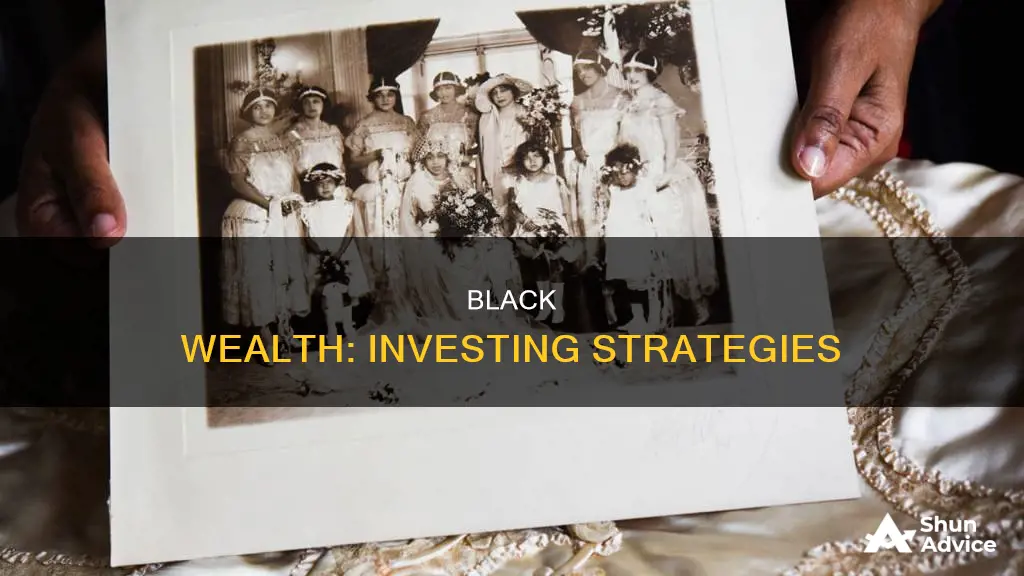
Black people have historically been underrepresented in investing, with systemic racism and discrimination acting as barriers to entry. However, there are several ways that Black people can start investing and build wealth.
One way is to work with a financial advisor or robo-advisor, who can provide guidance and support in navigating the complex world of investing. Another option is to invest directly in Black-owned businesses and startups, which often face challenges in accessing capital and may offer the opportunity to get in on the ground floor of emerging companies. Additionally, investing in minority empowerment exchange-traded funds (ETFs) or environmental, social and corporate governance (ESG) funds can support companies that align with social goals and values.
Other avenues for investing include peer-to-peer lending platforms, which provide access to capital for individuals who have been overlooked by traditional financial institutions, and investing in companies that financially support racial justice initiatives.
By utilising these investment strategies, Black people can take control of their financial future, build wealth, and contribute to the economic empowerment of the Black community.
| Characteristics | Values |
|---|---|
| Investing in Black-owned businesses | One of the best ways to have a positive economic impact on the Black community |
| Black investment professionals | Black former Wall Street executive Trevor Rozier-Byrd created the robo-advising app Stackwell with an all-Black management team to help the Black community invest smarter |
| Black-owned stocks | RLJ Lodging Trust (RLJ), Urban One, Inc. (UONE), Carver Bancorp, Inc. (CARV), Broadway Financial Corp. (BYFC) |
| Minority empowerment ETFs | NAACP Minority Empowerment ETF (NACP) |
| Peer-to-peer lending | SoLo Funds, Kiva |
| Black-owned banks | Black-owned banks and credit unions across the U.S. |
| Minority-owned stock exchange | Dream Exchange |
| Black financial advisors | Association of African American Financial Advisors |
| Black-owned investment platforms | Freeman Capital |
| Black-owned startups | AngelList Venture, Republic |
| Black-owned businesses | ByBlack, Black Directory, Black Woman Owned, Eat Okra, Official Black Wall Street |
What You'll Learn

Investing in Black-owned stocks and start-ups
Black-owned businesses are severely underrepresented in the public markets. According to a 2020 U.S. Census Bureau Annual Business Survey, of the 140,000 businesses in the U.S., only six are publicly traded on the NYSE and NASDAQ. However, Black-owned firms are making strides, and there are a few ways to invest in these companies and support racial justice.
Firstly, you can decide how much investing help you want. If you're a beginner, you might opt for a robo-advisor, which are automated investment services that use your data to build a portfolio. Some robo-advisors that offer portfolios that include minority empowerment-related investments are Wealthfront and Betterment.
If you want to invest on your own, you'll need a brokerage account. You'll also need to do your research to find Black-owned businesses. A good place to start is the National Minority Supplier Development Council (NMSDC), which defines a minority business enterprise (MBE) as a business that is at least 51% owned by United States citizens who are Asian, Black, Hispanic, and/or Native American.
- RLJ Lodging Trust (RLJ): A real estate investment trust with a portfolio of 96 hotels across 23 states and Washington, D.C.
- (UONE) Urban One, Inc.: A multimedia TV, online, radio, and digital audio company geared toward African American audiences.
- (CARV) Carver Bancorp, Inc.: A holding company for Carver Federal Savings Bank, the largest African-American-operated bank in the United States.
- (BYFC) Broadway Financial Corp.: A holding company for City First Bank, a federally chartered savings bank and Community Development Financial Institution (CDFI).
- (AXSM) Axsome Therapeutics: A biopharmaceutical firm that develops novel therapies for managing central nervous system (CNS) disorders.
- (AMS) American Shared Hospital Services: A company that provides equipment to hospitals and medical centers, specialising in leasing radiosurgery, proton beam radiation therapy, and intensity-modulated radiation therapy equipment.
In addition to investing in publicly traded companies, you can also consider investing in start-ups or private companies. For example, Republic allows investors to find emerging businesses with Black founders and invest with as little as $50. You can also explore Black-owned banks, such as those listed by NerdWallet.
Investing in Others: A Worthy Bet
You may want to see also

Investing in real estate outside of the primary home
Redlining is a process where certain areas are labelled as "risky" for a home loan, and African Americans are relegated to areas with the most poverty and deteriorating housing. This leads to a vicious cycle where residents struggle to receive loans, businesses close, and tax revenue decreases, further depressing the community. Despite the Fair Housing Act of 1968 recognising such practices as unconstitutional, the foundationally racist landscape of the American housing market persists.
Blockbusting is another discriminatory practice where real estate agents and developers use fear-mongering to convince residents in a particular area to sell their properties at below-market prices by claiming that racial minorities will soon be moving into the neighbourhood. These properties are then sold at inflated prices to Black families seeking upward mobility.
Despite these challenges, there are some ways that Black people can invest in real estate outside of their primary home. One option is to work with a financial advisor or investment platform that understands the unique challenges and barriers faced by Black Americans when it comes to investing. For example, Freeman Capital is a Black-owned and founded investment platform that offers automated investing and consultations with CFPs.
Another option is to explore peer-to-peer lending, which can provide access to capital for individuals who have been overlooked by traditional loan programs. SoLo Funds is an example of a peer-to-peer lending company that gives borrowers the ability to set their own loan terms and offers "appreciation tips" to lenders.
Additionally, Black people can consider investing in Black-owned banks and credit unions, which may be more committed to reinvesting in the community and offering initiatives that support the African American community.
Finally, it is important to stay informed about policies and practices that contribute to housing discrimination and to advocate for change. This includes supporting organisations and politicians that are working to rectify decades of injustices and increase access to homeownership for Black Americans.
Middle-Aged Investors: Saving Enough?
You may want to see also

Investing in minority empowerment funds
Decide on the Level of Investing Help You Need
If you're new to investing, consider using a robo-advisor service. These automated services build a portfolio tailored to your personal factors, such as age and risk tolerance. They are also often more affordable than traditional financial advisors. Some robo-advisors that offer portfolios with minority empowerment investments include Wealthfront and Betterment.
Choose an Investing Account
To start investing, you'll need a brokerage account. This is where your investments will reside. It's important to choose the right account for your needs, as some accounts offer specific tax benefits that can save you money in the long run.
Research Minority Empowerment Funds
There are a variety of funds that focus on minority empowerment, including mutual funds and exchange-traded funds (ETFs). One example is the NAACP Minority Empowerment ETF (NACP), which tracks the Morningstar Minority Empowerment Index. NACP provides exposure to US companies with strong racial and ethnic diversity policies, empowering employees regardless of their race or nationality. Additionally, all net advisory profits from NACP's management fee are donated to the NAACP to further their mission of ensuring equal rights for all.
Invest in Companies that Support Racial Justice
Another way to promote minority empowerment is to invest in companies that financially support racial justice initiatives. In recent years, several corporations have pledged money toward anti-racism efforts. By investing in these companies, you can show your support for their commitment to making a positive impact.
Explore Non-Traditional Investing Methods
Traditional investment vehicles like stocks and ETFs are not the only way to support racial justice. For example, peer-to-peer lending companies like SoLo Funds give underrepresented individuals access to capital and can provide diversification to your portfolio.
Additionally, platforms like Republic allow investors to support emerging businesses led by Black founders with as little as $50.
Support Minority-Owned Financial Institutions
Consider moving your money to a Black-owned bank or credit union. These institutions often have a stronger focus on reinvesting in their communities and supporting economic growth for minorities and low- to moderate-income populations.
By following these steps, you can start investing in a way that aligns with your values and supports minority empowerment.
Cramer's Investing Club: Strategies and Secrets
You may want to see also

Investing in Black-owned banks
Black-owned banks are a great way to invest in the financial health and well-being of Black communities. They are also a powerful tool in the fight against systemic racism in the financial sector.
History of Black-owned banks
Black-owned banks first emerged as an alternative to larger institutions, which have historically excluded Black Americans from access to credit and banking services. The first Black-owned bank, True Reformers Bank, was founded in 1888 by Rev. William Washington Browne, a former slave and Union Army officer. From 1888 to 1934, more than 134 Black-owned financial institutions were founded, mostly in Southern states. However, their numbers declined during the Great Depression, and the savings and loan crisis in the 1980s wiped out 35 Black-owned banks. Today, there are 22 Black-owned banks in the US, managing around $625 million in assets.
Benefits of Black-owned banks
Black-owned banks provide customers with access to financial resources and the opportunity to invest in their communities. They also tend to focus their lending on small businesses, nonprofits, and Black homebuyers, and are more willing to tolerate higher levels of risk than other institutions. During the 2007-2008 financial crisis, while there was a 69% drop in all mortgage lending to Black borrowers, the number of mortgages provided by Black-owned banks rose by 57%.
Examples of Black-owned banks
- OneUnited Bank: the largest Black-owned bank in the US, with branches in California, Florida, and Massachusetts.
- Liberty Bank: one of the largest Black-owned banks, with branches in nine states.
- Commonwealth National Bank: the only MDI (Minority Depository Institution) in Mobile, Alabama, and one of two in the state.
- Citizens Trust Bank: the oldest continuously operating Black-owned bank in the US, founded in 1921.
- Carver Federal Savings Bank: founded in 1948 to serve African American communities with limited access to financial services, with branches in low- to moderate-income neighborhoods in New York and Jamaica, Queens.
- First Independence Bank: the only African American-owned bank headquartered in Michigan, with branches in Detroit and Minneapolis.
How to support Black-owned banks
Anyone can join a Black-owned bank, and doing so is a great way to support their mission of closing the wealth gap in America. By depositing funds in a Black-owned bank, you empower them to lend more funds to African American-owned businesses, creating opportunities for employment, mentorship, and educational advancement in the Black community.
Theft of Investments: A Growing Concern
You may want to see also

Investing in Black-owned businesses
Research Black-owned businesses
Before investing, it's important to do your research. Look for Black-owned businesses that are publicly owned and have a diverse range of industries and locations. The National Minority Supplier Development Council (NMSDC) defines minority-owned businesses as those with at least 51% ownership by individuals from that minority group. Some Black-owned publicly traded stocks to consider include RLJ Lodging Trust (RLJ), Urban One, Inc. (UONE), and Carver Bancorp, Inc. (CARV).
Decide how much investing help you want
If you're new to investing, consider using a robo-advisor. These automated investment services build a portfolio based on your age, risk tolerance, and other factors. Wealthfront and Betterment are two examples of robo-advisors that offer portfolios with minority empowerment-related investments.
Choose an investing account
To invest in stocks, you'll need a brokerage account. Choose an account that suits your needs and offers specific tax benefits. Some options include online brokerage accounts or working with a traditional financial advisor.
Invest directly in Black-owned businesses
Another way to support Black-owned businesses is by investing directly. Due to historical and systemic barriers, Black-owned businesses often face challenges in accessing capital. You can help close this capital gap by investing in Black-owned small businesses in your community. For example, you can use investment crowdfunding platforms like Honeycomb Credit, which connect community members with local businesses.
Explore Black-owned banks and financial institutions
Consider moving your money to a Black-owned bank or financial institution. These institutions often have a stronger focus on reinvesting in the community and supporting initiatives for the African American community. Additionally, minority deposit institutions (MDIs) tend to originate a greater share of their mortgage loans to minorities.
Learn from Black financial professionals
Seek guidance from Black financial advisors or investment platforms. For example, the Association of African American Financial Advisors offers a directory of Black financial advisors. Freeman Capital is another option, a Black-owned investment platform that offers automated investing and consultations.
Why Early College Programs Are Worth the Investment
You may want to see also
Frequently asked questions
Some ways to invest in the Black community include:
- Regularly purchasing from Black-owned businesses
- Choosing Black investment professionals to work with
- Learning how to invest directly in Black businesses
- Investing in Black-owned stocks, startups, and minority empowerment ETFs
- Getting involved in peer-to-peer lending
Some famous Black investors include:
- Robert F. Smith, founder, chairman and CEO of private equity firm Vista Equity Partners
- Suzanne Shank, CEO, president and co-founder of investment banking firm Siebert Williams Shank & Co.
- Mellody Hobson, co-CEO of investment firm Ariel Investments and chairman of the board at Starbucks
- John W. Rogers, founder, co-CEO, and chairman of Ariel Capital Management
- Daymond John, founder, president and CEO of fashion label FUBU (For Us By Us)
- Travers J. Bell, founder and owner of the only Black-owned firm on the New York Stock Exchange in 1971
Some investing platforms and funds that support the Black community include:
- Stackwell, a robo-advising app with an all-Black management team
- AngelList Venture, a platform for startups that allows investors to invest in the Global Black Syndicate
- Republic, a platform that allows investors to search directories of Black-owned businesses and startups
- Impact Shares NAACP Minority Empowerment ETF (NACP), an exchange-traded fund (ETF) that focuses on minority empowerment
- Kiva, a peer-to-peer lending platform that offers microloans at a zero percent interest rate
Some challenges that Black investors face include:
- A history of discrimination and psychological hurdles within their cultures
- Lower levels of exposure to stocks and the stock market at a young age
- Lack of representation and diversity in the financial industry
- Higher preference for real estate and no-risk savings accounts
- Lack of access to capital and funding for Black-owned businesses and startups
According to a study by Credit Suisse Research and The Heller School for Social Policy and Management, the top 5% of African Americans with a median net worth of $739,000 or more tend to have a more conservative approach to investing than their white counterparts. They own less in stocks and bonds and more in CDs, savings bonds, and life insurance. They also invest more in real estate outside of their primary homes, with 41% of non-financial assets compared to just 22% for whites in the same income bracket.







